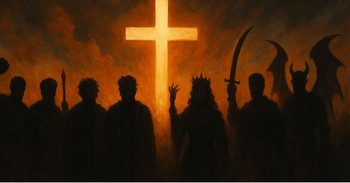Christianity.com: Popular Topics in Christian Living
Christian living is about applying biblical principles to everyday life—at home, in relationships, in prayer, and in community. This collection features some of the most viewed and frequently searched articles on Christianity.com. Organized by specific themes, these pieces offer guidance, encouragement, and insight for living out the Christian faith.
Table of Content
Christian Identity & Calling
Christian Media & Fiction
Christianity & Culture
Communication & Boundaries
Family & Parenting
Mindset, Habits & Personal Growth
Prayer & Spiritual Growth
Relationships, Dating & Marriage
Spiritual Warfare & Protection
Struggles, Doubt & Emotional Health
Theology & Christian Doctrine in Everyday Life
Christian Identity & Calling
What is the True Meaning of Life Finding Your Purpose in Life
Softly and Tenderly Jesus is Calling Hymn
The Purpose of Pain
What is the Purpose of Baptism in the Christian Life
What Does the Bible Say About Sexual Identity
God's Purposes for Our Work
What Does the Bible Teach Us About Finding Purpose in Life
Is God Calling You to Write a Book
5 Truths to Embrace About Your Identity as a Child of God
Christian Media & Fiction
Top Christian Podcasts
10 Important Christian Fiction Authors You Should Know
10 Christian Podcasts to Give You Hope and Peace This Year
Top Christian Podcasts - Best
5 Lessons From the Chronicles of Narnia
Top Christian Podcasts - Bible
Christianity & Culture
Top Bible Movies of All Time
Movies About Martyrs
Christian Movies 1970s Jesus Revolution
5 Christian Celebrities Who Live Out Their Faith in Hollywood
Interesting Pro Life Movies to See Today
Top 5 Christian Movies to Watch on Netflix
5 Ways Facebook May Be Harming Your Christian Life
7 Steps to Using Technology for God's Glory
A Christian Perspective on Horror in Movies and Culture
3 Ways Christians Can Respond to the Problem of Homelessness Today
Communication & Boundaries
5 Biblical Boundaries to Set With Others
What is the Importance of Communication in Marriage
5 Boundaries to Set With Toxic Parents
5 Ways to Deal With a Toxic Sibling Relationship
Family & Parenting
Can Christians Biblically Choose Not to Have Children
What Should Christians Know About IBLP and Shiny Happy People: Duggar Family Secrets
What is the Importance of Having a Spiritual Family
What is the Significance of Motherhood in the Bible
How Are Children Gifts From God
How Should We Apply the Apostle Paul's Teachings About Family and Work Relationships in Today's World
What Responsibility Do Parents Have in Raising Children
Top Christian Podcasts - Family
Six Truths About How to Model Faith for Your Children
Should Christian Parents Spank Their Children
3 Sneaky Idols Destroying Motherhood Today
Should the Church Do More to Help Crisis Pregnancy Centers and Single Parents
Mindset, Habits & Personal Growth
Prayer & Spiritual Growth
Wedding Blessings Scripture Prayer Marriage
Spiritual Growth Quotes
A Prayer for My Husband
Back to School Prayers From Psalms Proverbs
Ways to Invest in Your Spiritual Growth This Year
7 Surprising Habits for Joyful Spiritual Growth
4 Keys to Healing Your Soul
Top Christian Podcasts - Prayer
A Prayer for Marriage
4 Prayer Killers
Relationships, Dating & Marriage
Does the Bible Say Anything About Kissing Before Marriage
What Does it Mean to Be Unequally Yoked in Marriage
What Does in Sickness and in Health Mean in Marriage
What is the Origin of Traditional Marriage Vows
What Are the Benefits of Marriage in the Christian Life
Does God Give the Promise of Marriage to Us
Are the 5 Love Languages in a Marriage Biblical
Is it Important for Christians to Get a Marriage License
Why Does Marriage Exist If it Doesnt in Heaven
Advice for Inter Denominational Dating and Marriage
What is the Biblical Definition of Marriage
How Are Business Ethics and Relationships Addressed in the Bible
Does the Bible Say Anything Living Together Before Marriage
What Are Biblical Reasons for Remarriage
Is it Biblical to Find the One in Marriage
Is Match Made in Heaven in Marriage Biblical
How Can Christian Singles Decipher Between Love and Lust Before Marriage
How Can Believing in Soulmates Ultimately Ruin Your Marriage
Why Are Husbands Told to Love Their Wives
How Are Words of Affirmation Important for Husbands
How Should Christians Approach Dating
What Should Christian Singles Know About Online Dating
Spiritual Warfare & Protection
What is Spiritual Warfare
What Does the Bible Say About Karma and Its Dangers
9 Ways Satan Seeks Your Destruction
9 Ways Satan Seeks Your Destruction Every Day
How Seriously Do Christians Need to Take Spiritual Warfare
3 Dangers of Generational Pride
Sneaky Lies the Enemy Wants You to Believe and How to Fight Back
4 Reasons to Put on the Armor of God Every Day
What Should Christians Know About the Satanic Panic
4 Dangers of Saying Well the Lord Told Me
What Are the Dangers of Purity Culture
Struggles, Doubt & Emotional Health
Christian Books on Depression
4 Things to Do When Trials Make You Want to Throw in the Towel
5 Truths for Underachievers
3 Things to Do When You Doubt Your Calling
3 Ways to Turn Your Failure Into Success
Theology & Christian Doctrine in Everyday Life
10 Roles of the Holy Spirit in Christian Life
Hymns About Gospel Praise Word of God
5 False Gospels Within the Evangelical Church
16 Reasons Not Ashamed of the Gospel
4 Ways Theology is Practical for Everyday Life
How We Prepare Share the Gospel
Places in Europe That Need the Gospel
5 Ways Christians Can Make an Impact for the Gospel
Immigration and the Gospel
Come Down O Love Divine a Powerful Reminder of the Holy Spirit's Work
Three Surprising Ways to Grieve the Holy Spirit
Are You a Good Steward of the Gospel
10 Valuable Reasons to Know the History of Christian Theology















